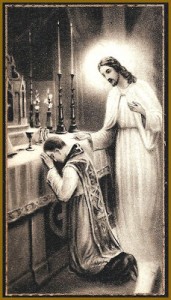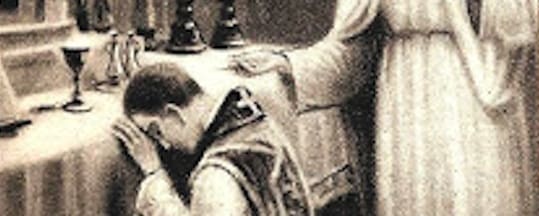Dear Father John, I hate to admit this, but I still get distracted at Mass. I mean, I love Mass! I go almost every  day! I believe in it, I look forward to it… But I still get distracted during Mass. I really wish I didn’t – I want to worship God perfectly, like we’re supposed to. Can you help me?
day! I believe in it, I look forward to it… But I still get distracted during Mass. I really wish I didn’t – I want to worship God perfectly, like we’re supposed to. Can you help me?
As long as we are human, we will be battling distractions. Even the Catechism makes this clear: “The habitual difficulty in prayer is distraction” (#2729). So, the first piece of useful advice is, simply, don’t panic. Accept your limitations, then gradually learn to recover more and more quickly from distractions when you notice them. Here again the Catechism gives sure, wise, and realistic guidance:
“To set about hunting down distractions would be to fall into their trap, when all that is necessary is to turn back to our heart: for a distraction reveals to us what we are attached to, and this humble awareness before the Lord should awaken our preferential love for him and lead us resolutely to offer him our heart to be purified. Therein lies the battle, the choice of which master to serve.” (CC #2729)
Guarding the Heart at Mass
Now, when it comes to keeping the heart’s custody during Mass, one powerful ally is a deeper understanding of the mystery being celebrated, of the nature of the Mass itself. For the long term, cultivating this deeper understanding will bear much more fruit than tricks like getting to Mass early to recollect yourself, or focusing on the visual symbols in the church. Permit me, then, to offer some reflections on this mystery, from the point of view that the Letter to the Hebrews gives us in Chapter 10, the point of view of Christ as our High Priest.
Is God Contradicting Himself?
In a certain sense, it appears that this Chapter of Scripture contradicts Catholic practice. At one point, in Hebrews 10:10-12, the sacred writer tells us about the difference between the Old Testament sacrifices and the New Testament sacrifice offered by Christ on the cross: “…[W]e have been consecrated through the offering of the body of Jesus Christ once for all. Every [Old Testament] priest stands daily at his ministry, offering frequently those same sacrifices that can never take away sins. But this one [Jesus] offered one sacrifice for sins, and took his seat forever at the right hand of God.”
So the writer of this Letter to the Hebrews is saying that Jesus already offered his priestly sacrifice once for all, and therefore he has no need to offer a daily sacrifice. But (and here comes the apparent contradiction) if that’s the case, why does the Catholic Church – indeed, why do almost all Catholic parishes – offer Mass every single day? Why do we even offer Mass every Sunday, if Jesus already offered his sacrifice “once for all”?
After all, the Catechism teaches us that Holy Mass, the Celebration of the Eucharist, is in fact a sacrifice
(CCC #s 1359, 1360, 1365): “Because it is the memorial of Christ’s Passover, the Eucharist is also a sacrifice… The Eucharist is a sacrifice of thanksgiving to the Father… The Eucharist is also the sacrifice of praise.”
Do you see this apparent contradiction? On the one hand, the Letter to the Hebrews tells us that because of Jesus’ self-sacrifice on the cross two thousand years ago, we don’t have to “offer sacrifice day after day.” While on the other hand, in actual fact, by celebrating the Eucharist every single day, that’s exactly what the Church is doing – offering sacrifice day after day! What’s going on here?
Already we are entering into the deep mystery present at every single Mass. If we can come to understand why this apparent contradiction is in actual fact not a contradiction, we will find ourselves living the Mass with spontaneous reverence and even amazement. Distractions will have a much harder time derailing the attention of our hearts.
Two key words will help us solve this puzzle: sacrifice and memorial.
The Universal Presence of Sacrifice
All religions throughout the history of the world use some kind of sacrifice to help establish and maintain a healthy relationship with God. This was true in the Old Testament Jewish religion too. Some religions would sacrifice a part of their harvest, or a portion of the results of their hunting, or even human beings – enemies that they may have captured in war, for example. In sacrificing these valuable things, they would destroy them in a ritualized fashion, surrounding the ritual with prayers to their gods. Why did they do this? For two reasons.
Healthy Dependence, Healthy Guilt: Worship and Atonement
First, they recognized that they were dependent on divine forces for their existence. If the sun stopped shining, for instance, their crops would not grow, there would be no harvest, and they would starve to death. But they had no power to make sure that the sun continued to shine – only the gods could do that. So they would offer to the gods a sacrifice of something valuable to themselves, hoping that this act of humility and worship would please the gods and convince them to continue supporting their existence.
Second, they recognized that they often committed evil, which was displeasing to the gods. They recognized that their evil actions, their sins, deserved to be punished by the gods who tolerated no evil. So, by offering a sacrifice of something valuable to themselves, they hoped to atone for their sins, appeasing the anger of the gods and assuring their own survival.
A Spiritual Catch-22
These were the religious instincts present in human nature, even in primitive religions. But we know that sacrifices of goats or cows or corn or wine, or even of sinful human beings, were entirely inadequate. These finite objects were limited and imperfect, tiny creatures that had come from God in the first place, so how could they give due honor and worship to God, or repair for sins that rebelled against a God of infinite wisdom and truth? They could not. And yet, the fallen human race needed to worship God and atone for our sins – otherwise, we would be cut off from God and frustrated in our pursuit of everlasting happiness, which consists in living in communion with God (and that is what we were made for).
Jesus to the Rescue
God himself came to our rescue and gave us a solution to this existential dilemma. He sent his own Son, Jesus Christ, among us, through the incarnation. And Jesus, being true God and true man, as we proclaim each week in the Creed, could offer the perfect sacrifice: a worship and an atonement that were both fully human, because of his sinless human nature, and also infinite and of infinite value, because of his divine nature. Jesus offered that perfect sacrifice of his own body when he allowed himself to be crucified. Through his crucifixion, he took upon himself the punishment for our sins, and he offered himself – true God and true man – as the perfect act of worship and praise.
Jesus on the Cross is indeed the perfect sacrifice, “the pure victim, the holy victim, the spotless victim,” as the priest describes it during Mass in the First Eucharistic Prayer. But Jesus was not only the victim in the perfect sacrifice. He was also the one who offered the victim – in other words, the priest. This is why the Letter to the Hebrews calls Jesus the high priest who is “holy, innocent, undefiled, separated from sinners.” In all of human history, only Jesus’ self-offering on Calvary is a sacrifice that gives perfect worship to God and makes perfect atonement for sin, because both the priest and the victim are perfect: sinless, fully human, and fully divine. This is the perfect sacrifice, made “once” on the Cross at Calvary.
In our next post on this topic, we will discuss the connection of Jesus’ sacrifice on the cross and the meaning of the Mass as a memorial. And then, how do we respond…


